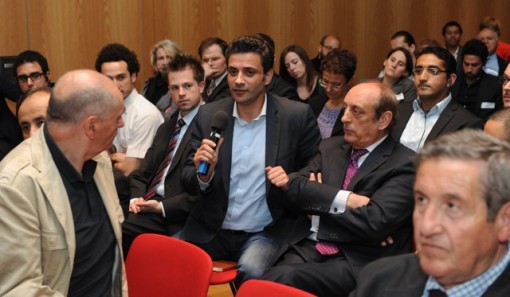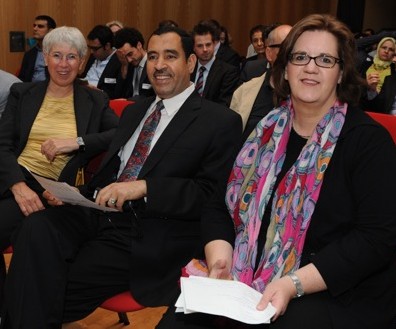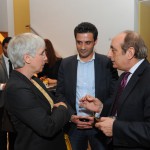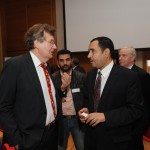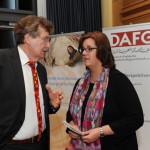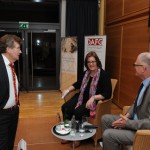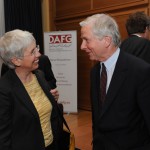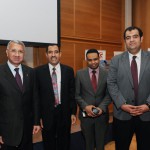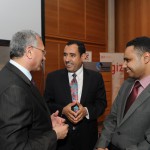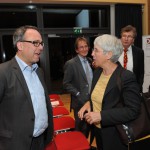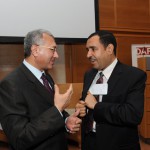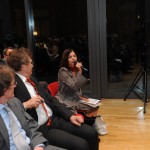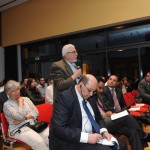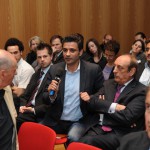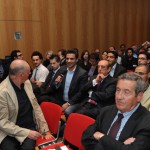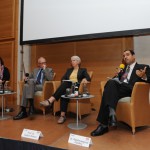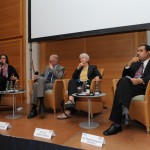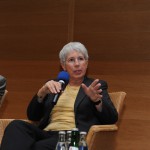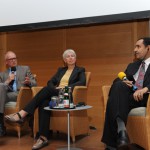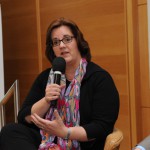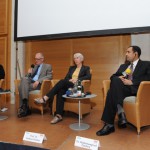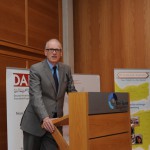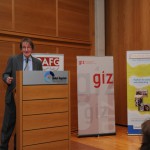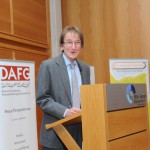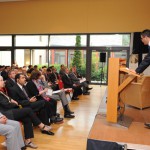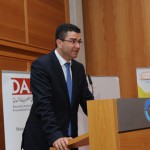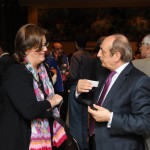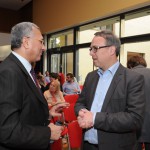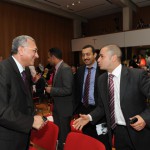How do religious values inform political discourse in Germany and in the Arab world? To what extent should they factor into the political decision-making process? The intercultural panel discussion that took place as part of the Parliamentary Evening in Berlin made for lively and at times heated discussion that lasted until midnight.
The evening’s topic touched on issues that are part and parcel of everyday discussions for the 90 DAAD scholarship holders enrolled in the German-Arab Master’s programmes, which number five in all. They were gathered in Berlin as part of the annual “Berlin Seminar”. Hosts of the lively panel discussion were the DAAD and the German-Arab Friendship Society (DAFG).
“When we discuss the facts in our courses, we automatically address the assumptions about society and religion that are at play,” says Vera Klöttschen from Bonn, who is currently getting her Master’s in the German-Arab programme in Integrated Water Resources Management (IWRM) at the University of Jordan in Amman and at the Cologne University of Applied Sciences. “We confront each other with our views, compare them and find what they have in common.”
Vera, together with her fellow Master’s students from several Arab countries, followed the discussion in Berlin closely and with great interest. Panel participants included Abdelmagaud Darderi, Member of Egypt’s Freedom and Justice Party and member of Parliament of Egypt, member of the Germany Bundestag Kerstin Griese from the Social Democratic Party (SDP), and Professor Gudrun Krämer, director of the Institute of Islamic Studies at the Freie Universität Berlin.
Controversial and critical
Kerstin Griese also serves as the SPD’s appointee for church affairs. Using concrete examples she illustrated the relationship between her values, which she promotes politically, and her Christian faith. Her faith, however, does not play into every political decision. “It was new and interesting for me to see a Christian in the political context,” says Jihed Mejrissi from Tunisia. He is currently enrolled in the University of Marburg’s Master’s programme “Economic Change in the Arab Region” (ECAR), which it started in 2008 with the University of Damascus. The German university was forced to find a new partner, however, due to the political situation in Syria. It now works with the Lebanese American University in Beirut.
The scholarship holders did not go easy on the panel members. In response to the question of how one reconciles German arms exports with Christian values, Kerstin Griese explained that she is both personally and politically, as an opposition politician, against German arms sales. “I wasn’t buying it one bit,” says Sebastian Klos from the IWRM programme; his Arab colleagues were equally doubtful. As Klos points out, the SPD also sold arms when it was running the government.
DAAD scholarship holder Mahy Mourad from Cairo was also critical of Abdelmagaud Darderi, who as a member of Egypt’s Muslim Brotherhood, described his faith as a way of life and a social movement. As such, Islam influences and determines his work as a member of parliament every step of the way. For Mahy Mourad, it’s too one-dimensional. She would have liked to have seen someone on stage representing the other perspective, i.e. an Egyptian who is critical of the strong relationship between religion and state. Mahy Mourad is studying Integrated Urbanism and Sustainable Design (IUSD) at the University of Stuttgart and Ains Shams University in Cairo.
Focus on common bonds, not differences
Islamic Studies expert Gudrun Krämer remarked that historically, religion and politics did not always go hand-in-hand. For the Egyptian student Heba Badr from the IUSD programme, introducing historical aspects takes the debate in a completely different direction altogether. “There was too much focus on the differences between Christianity and Islam,” she says. “I would have preferred a more concrete discussion on values that we all have in common.”
Mohamed Allani from Tunisia agrees, saying that the panel discussion was too entrenched in age-old prejudices and disputes. “Within six months, those of us in the bi-cultural Master’s courses have changed our perspectives completely. It’s really quite amazing,” says Allani, who is enrolled in the IWRM programme. Thanks to the Master’s programmes, he is convinced that young German and Arab professionals will accomplish something that the generations before them have not: “Realising that it’s not about criticising and denouncing the other – it’s about understanding one another. We focus on what we have in common, not on our differences.”
Vera Klöttschen, like her fellow students, comments on how much more open and productive their own discussions on science, politics and values are within their Master’s programmes, even when issues of religion come into the picture. “In that respect, we’re a bit further along than the panelists…”
What is the “Berlin Seminar”
The Berlin Seminar, part of the German-Arab Master’s programme, is designed to give participants insight into the workings of Germany’s parliamentary and government system. Through the seminar, the young professionals explore the relationship between development, economics, foreign policy and cultural politics. The scholarship holders meet in small groups with members of the German Bundestag and other political and civil society leaders. The Berlin Seminar was held for the fifth time this year.
Imagage Gallery Parliamentary Evening:
Photos: DAFG


